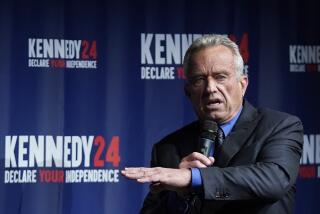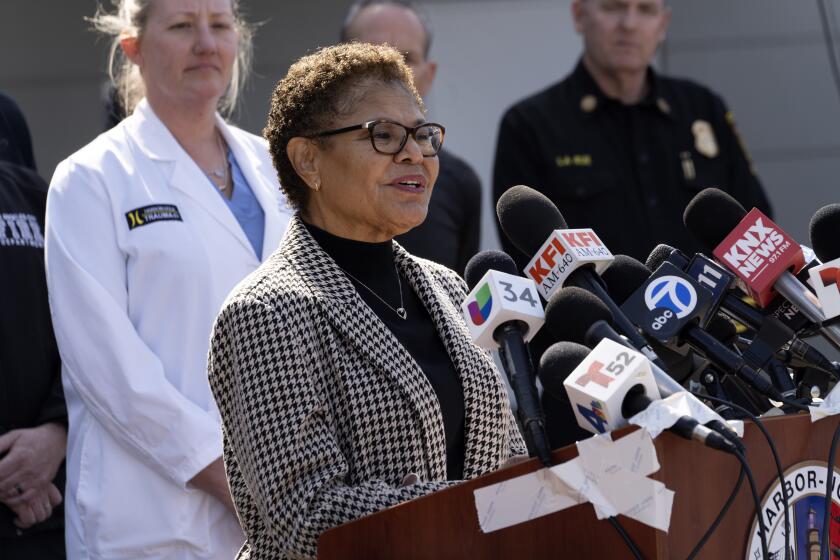Head-On Voter Collision Totals Special Interests
California’s voters have spoken. Here’s what they said: They hate insurance companies even more than they despise attorneys. They are skeptical of special-interest money and pleading. They have rejected the use of the initiative as a tool for special interests who want to “legislate” on their own terms. In short, California voters showed an independent, populist streak.
The outcome of the state’s insurance-reform initiatives underscored the voter trend against special-interest money and pleading. Proposition 100, a “consumer” initiative, closely linked to the state’s trial lawyers, was rejected. But 103, the Ralph Nader-backed, consumer-reform package--which was the insurance initiative least identified as the work of narrow special interests--defeated the industry’s no-fault plan (104) and limits on attorney’s fees (106). And it won despite a barrage of negative advertising and lopsided campaign spending of more than $60 million by the insurance industry.
Voters also rejected the pleas of tobacco companies and approved Proposition 99, the cigarette-tax initiative, despite a $16-million-plus campaign to defeat it.
Given the inability of well-heeled, high-powered interest groups to dominate the process this time out, we might hope for a truce in California’s initiative wars. It’s time not only for special interests, but for all Californians to rethink the use--and abuse--of the initiative process.
Yes, it has cut through the insurance mess--something the Legislature has been unable to do. And its solution seemingly thumbs its nose at the special interests who have blocked reform for years. Maybe that means that “the people” have reclaimed direct democracy. So what? Proposition 103 may have sent a message to insurers and Legislators, but it’s still bad policy.
An issue as complex as insurance reform requires a balanced approach--give a little, take a little, spread the costs and benefits around. That’s what good public policy does. But as a product of an uncompromising process, 103 won’t do that. With little room for adjustment, on the day after the election the initiative was mired in the courts, its constitutionality and mandated rate-rollbacks under attack. Relief is not just a swallow away.
Like many initiatives, 103 deals with only one side of a complex equation. It addresses the high cost of premiums, but it does not attack soaring claims or the attorneys’ fees that contribute to those costs.
That might be as difficult to achieve as the “consumer-responsive” elected insurance commissioner the authors of Proposition 103 envisioned. This is because policy cannot be addressed in a vacuum--a truism that initiative writers sometimes ignore.
The current reality is that trial lawyers and insurers may gain in political clout under the system of campaign financing imposed by Proposition 73--an initiative passed by Californians last June that places a $1,000 limit on individual contributions to candidates.
It is relatively easy to motivate attorneys or insurance agents to donate at that level--they will retain significant influence on legislators and can put similar pressure on an elected insurance commissioner who needs campaign money. There is no guarantee that policy gridlock and the round of obscene initiative spending it has spawned won’t happen again.
What else has this election shown us? Californians have witnessed another dos-a-dos in the dance of state political leadership.
Republicans and Democrats both viewed last week’s legislative elections as crucial to their party’s control of the 1990 reapportionment. In the state Senate, Democrats and Republicans held their own incumbents. However, in the Assembly, Republican leader Pat Nolan of Glendale, dogged by his involvement in the recent FBI legislative “sting,” presided over his party’s possible loss of three seats. In politics, you aren’t rewarded for losing; on Thursday, conservative Orange County Assemblyman Ross Johnson of La Habra was selected by the Assembly Republican Caucus to succeed Nolan as minority leader.
Speaker Willie Brown managed to increase the Democratic majority in the Assembly, thereby making it nearly impossible for Republicans to gain control of the house in time for reapportionment. As a result, Brown has shored up his claim on the Speakership. There is still dissatisfaction with Brown’s lack of attention to policy and the eroding image of the Legislature during his tenure, but Brown did what a modern Speaker has to do to stay in power--he protected his majority.
Several gubernatorial hopefuls tested the political waters in this election. Some came off better than others.
Perhaps the best overall batting average belongs to Democratic State Controller Gray Davis. Davis supported Proposition 103 and was highly visible in the Los Angeles media market as a spokesman for the anti-oil-drilling forces who successfully opposed city Proposition P.
Another Democratic gubernatorial possibility, State Superintendent of Public Instruction Bill Honig, did what he couldn’t do in the June primary--he attached his name to a winning initiative, Proposition 98, which establishes a minimum guaranteed level of state school funding. And he chalked up a victory against Gov. George Deukmejian.
Deukmejian once again had a rocky ride at the polls. He poured hundreds of thousands of dollars of his campaign funds into “Target ‘88,” an Assembly Republican political-action committee, but the GOP lost legislative ground. The governor actively campaigned against Proposition 97, an initiative to restore Cal-OSHA, the state’s worker-safety program that the governor abolished. He was trounced.
Voters also deserted Deukmejian on Propositions 99, the cigarette-tax initiative, and 102, which would have eliminated anonymous AIDS testing and required doctors to report to health authorities the names of AIDS-infected patients. The governor’s support for this controversial initiative, in the face of opposition by almost every major health organization, stunned political observers and led to speculation that he was giving up on a third term.
Last Tuesday Californians worked hard. They helped shape the federal government, approved a record $3.3 billion in bonding authority, established a revolutionary insurance system, set several new campaign spending records, approved a moderate public policy on AIDS testing, slogged through the country’s longest list of policy choices with aplomb and sophistication.
In general, Californians take their role in public policy-making seriously. When they care about an issue, they look beyond the money and the hype and vote their interests. That was a hard lesson for the insurance protagonists and the tobacco industry. It is a lesson the Legislature should remember when it convenes to do the people’s business next month.
More to Read
Get the L.A. Times Politics newsletter
Deeply reported insights into legislation, politics and policy from Sacramento, Washington and beyond. In your inbox three times per week.
You may occasionally receive promotional content from the Los Angeles Times.






